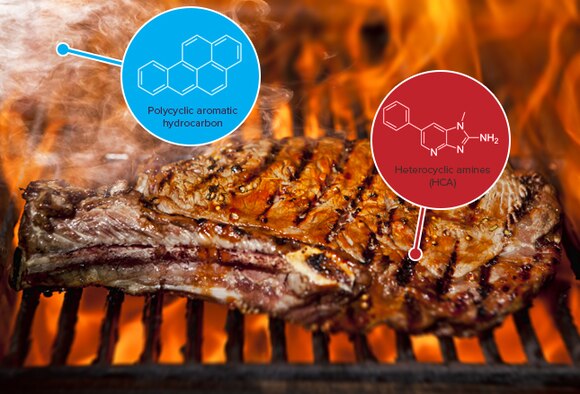CATERGORY: REJUVENATE PROSTATE
Cooking Meat Properly to Minimise Cancer Risk
Heterocyclic amines (HCAs) and polycyclic aromatic hydrocarbons (PAHs) are chemicals formed when muscle meat, including beef, pork, fish, or poultry, is cooked using high- temperature methods, such as pan frying or grilling directly over an open flame. In laboratory experiments, HCAs and PAHs have been found to be mutagenic—that is, they cause changes in DNA that may increase the risk of cancer.
HCAs are formed when amino acids (the building blocks of proteins), sugars, and creatine or creatinine (substances found in muscle) react at high temperatures. PAHs are formed when fat and juices from meat grilled directly over a heated surface or open fire drip onto the surface or fire, causing flames and smoke. The smoke contains PAHs that then adhere to the surface of the meat. PAHs can also be formed during other food preparation processes, such as smoking of meats.

HCAs are not found in significant amounts in foods other than meat cooked at high temperatures. PAHs can be found in other smoked foods, as well as in cigarette smoke and car exhaust fumes.
The formation of HCAs and PAHs varies by meat type, cooking method, and “doneness” level (rare, medium, or well done). Whatever the type of meat, however, meats cooked at high temperatures, especially above 300 oF (as in grilling or pan frying), or that are cooked for a long time tend to form more HCAs. For example, well-done, grilled, or barbecued chicken and steak all have high concentrations of HCAs. As well as cooking methods that expose meat to smoke contribute to PAH formation.
HCAs and PAHs become capable of damaging DNA only after they are metabolized by specific enzymes in the body, a process called “bioactivation.” Studies have found that the activity of these enzymes, which can differ among people, may be relevant to the cancer risks associated with exposure to these compounds.
Numerous studies have used detailed questionnaires to examine participants’ meat consumption and cooking methods. Researchers found that high consumption of well-done, fried, or barbecued meats was associated with increased risks of colorectal, pancreatic, and prostate cancer.
The formation of HCAs and PAHs can be minimised by:
1. Reducing Heat. Cook at temperatures below 148 degrees Celcius. Select hardwoods like hickory and maple and charcoal which burn at lower temperatures than soft woods like pine.
2. Reducing Cooking Time. The longer you cook something, the more HCAs are formed. Cut meats into small pieces for quicker cooking. And grill on foil to protect food from smoke and speed up cooking time.
3. Marinating for 30 minutes. Marinates that contain herbs and spices, fruit juices and vegetables, garlic, and wine supply antioxidants that inhibit the formation of HCAs.
4. Mixing Meat with Vegetables. Cook cubes of meat with vegetables. This reduces the surface area of meat exposed to the hot surface since the meat is also touching other ingredients during the cooking process.
5. Avoiding Char. The black, crispy crust on the body edges of ribs and steaks contain higher concentrations cancer causing compounds. Ensure grill grates are cleaned of previously generated char.
6. Reducing Smoke. Select leaner cuts of meat or trim away visible fat to lower the amount of dripping that comes back up as smoke. Also avoid piercing meats while they’re on the grill to prevent dripping.
7. Flipping Often. Fewer HCAs are formed if you turn meat over frequently while cooking.
8. Choosing Seafood. Since seafood cooks faster than beef and chicken, there is less accumulation of HCAs and PAHs. Also the World Health Organisation considers processed meats like hots dogs as carcinogens (cancer-causing) and red meat as probably carcinogen.


